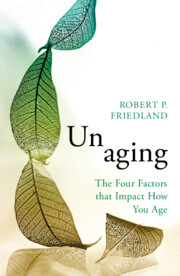Book contents
- Unaging
- Reviews
- Unaging
- Copyright page
- Dedication
- Contents
- List of Figures and Tables
- Preface
- Part I Foundations: What Do We Need to Know about Optimal Aging?
- Part II Applications: What Can We Do about the Opportunity of Aging?
- Part III Conclusions
- 26 Considerations for Society and the Future of Aging
- 27 Our Attitude and the Opportunity of Aging
- Acknowledgments
- Glossary
- References
- Index
26 - Considerations for Society and the Future of Aging
from Part III - Conclusions
Published online by Cambridge University Press: 15 September 2022
- Unaging
- Reviews
- Unaging
- Copyright page
- Dedication
- Contents
- List of Figures and Tables
- Preface
- Part I Foundations: What Do We Need to Know about Optimal Aging?
- Part II Applications: What Can We Do about the Opportunity of Aging?
- Part III Conclusions
- 26 Considerations for Society and the Future of Aging
- 27 Our Attitude and the Opportunity of Aging
- Acknowledgments
- Glossary
- References
- Index
Summary
Important worldwide changes in human aging are developing rapidly. Life expectancy has doubled during the past century. Due to advances in public health, vaccines, and science, people are living longer. The increase in the elderly population is happening in varying degrees all over the world. Although heart disease and cancer rates are falling, Alzheimer’s is increasing because of its strong link to aging and lack of disease-modifying therapies. It is important to consider what can be done about the expansion of aged populations. A forward-looking approach to health care will provide resources to people throughout life to keep them healthy and enhance their four reserve factors. This is ethically and economically preferable to a health care system which only takes care of people when they’re sick and doesn’t strive to prevent illness. Recent advances in diagnosis, metagenomics (studies of gut bacteria), and artificial intelligence will hopefully assist in the growth of preventive measures. Advances in public policy and technology can help people to enhance their four reserve factors and help them to avoid disease and remain fit as they age.
Keywords
- Type
- Chapter
- Information
- UnagingThe Four Factors that Impact How You Age, pp. 281 - 291Publisher: Cambridge University PressPrint publication year: 2022

